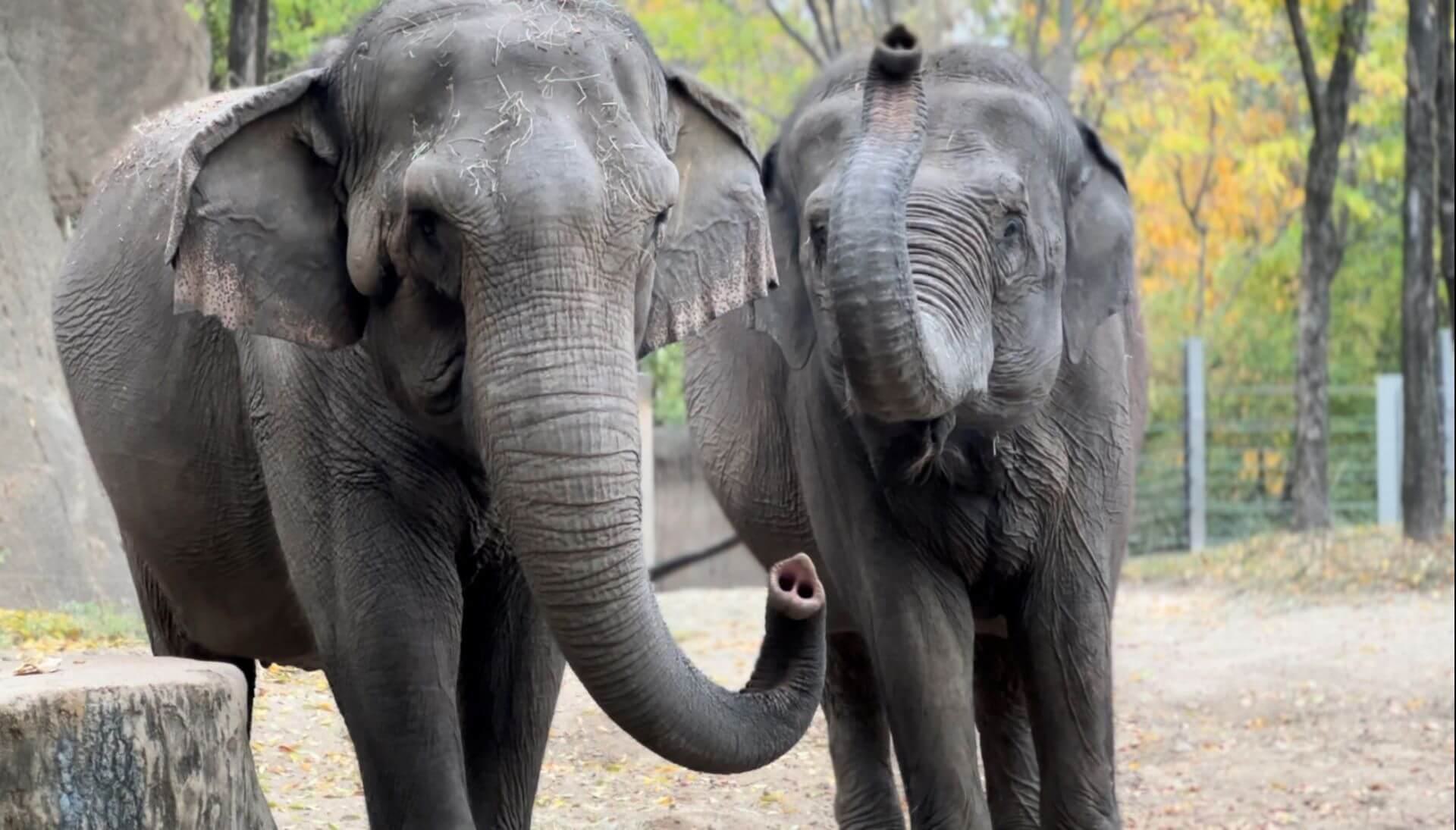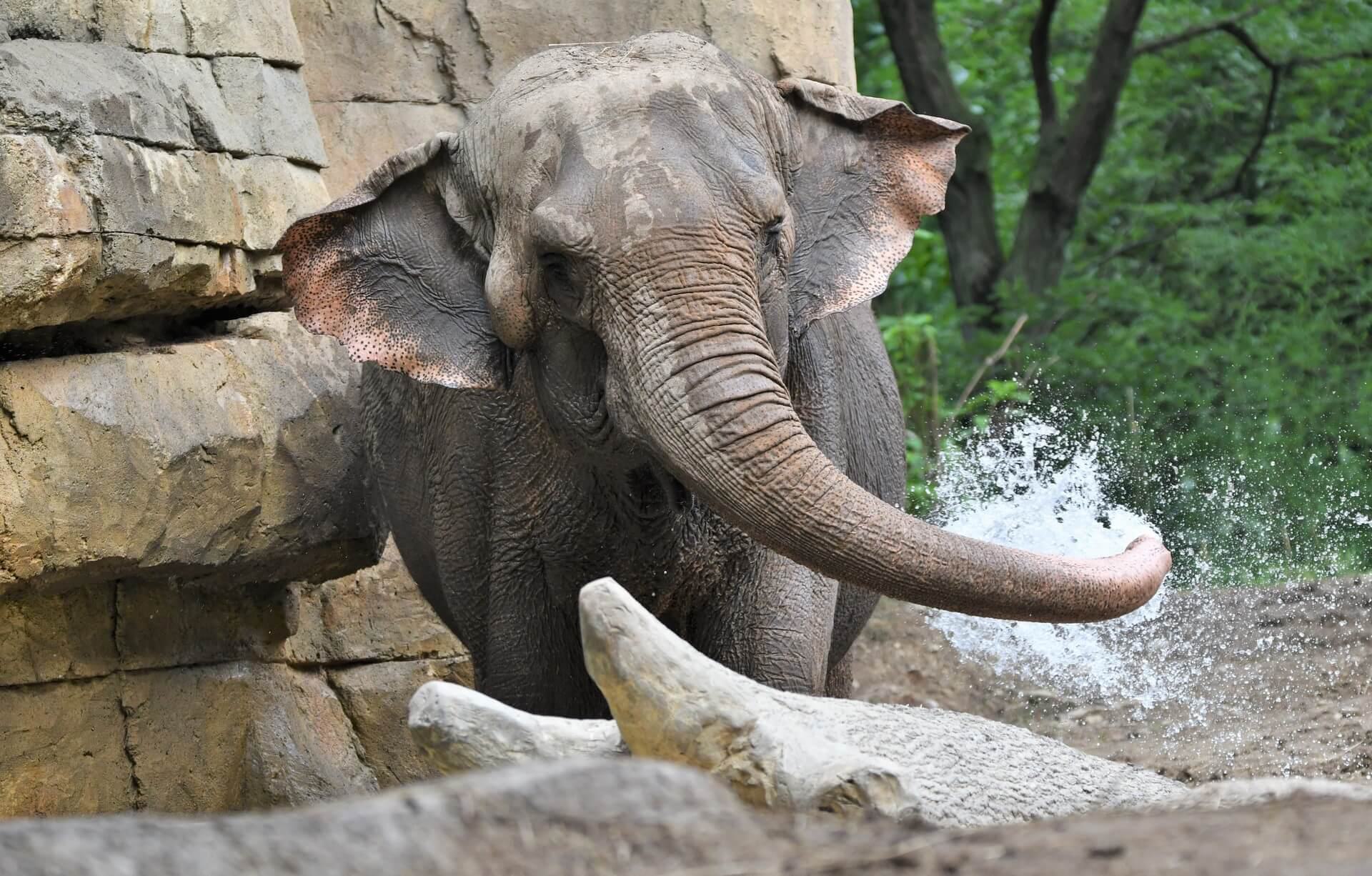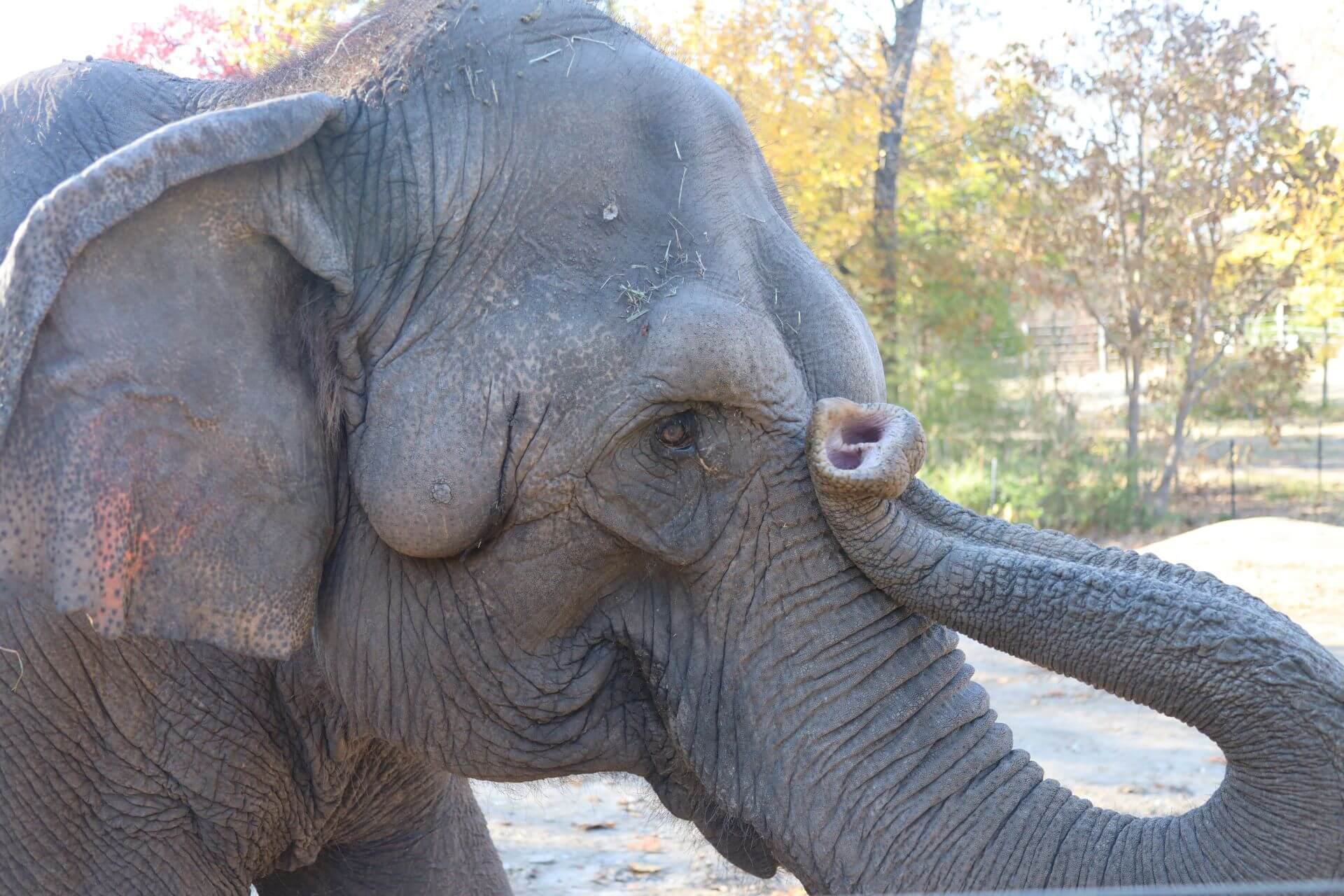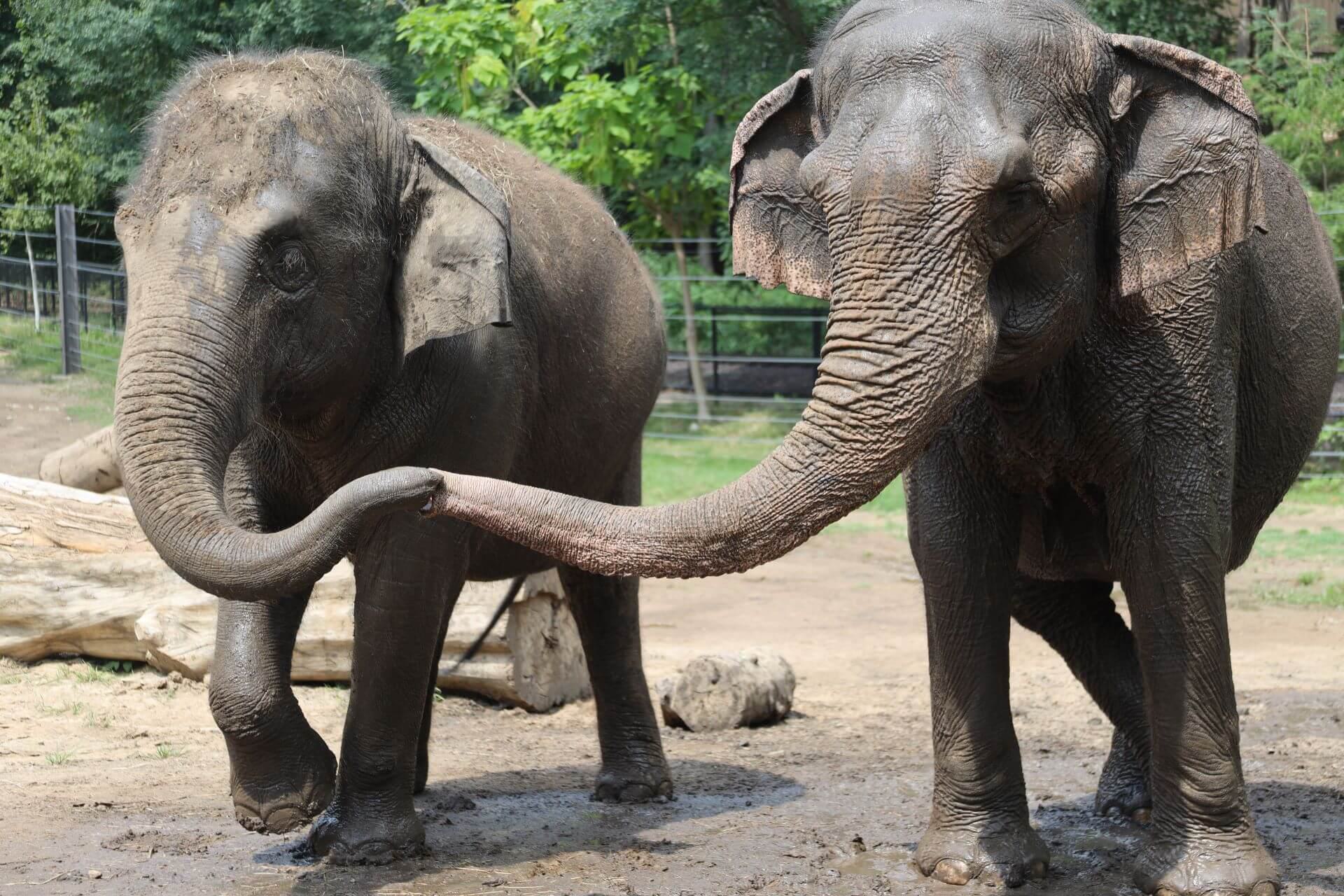The Saint Louis Zoo has said goodbye to beloved, elderly Asian elephant Donna. She was humanely euthanized this morning, Thursday, Nov. 9, 2023, at the age of 52, due to a rapid and irreversible worsening of her health over the last several days.
In October, she was diagnosed with primary hyperparathyroidism, which is caused by a tumor that secretes a hormone that controls the level of calcium in her body. As surgery was not an option, she was treated with medical management. As the tumor grew, the medication became less effective. Over the last few days, her condition declined significantly, and after careful consideration and welfare assessments regarding her prognosis, the Animal Care team decided that euthanasia was the kindest and most humane action.
“All who knew and loved Donna will miss her greatly,” said Regina Mossotti, Vice President of Animal Care, Saint Louis Zoo. “Our dedicated and expert Animal Care team did everything in their power to make sure Donna was comfortable as they managed her end-of-life care. While we grieve her loss, we’re grateful for the many memories she gave us and the public in her decades at the Zoo. We ask for the community’s thoughts and support during this difficult time.”
Donna lived a long and full life, a reflection on the great care she received during her years at the Zoo. The median life expectancy for Asian elephant females under human care is 47.5 years old.
The Animal Care team had a great relationship with Donna and because of this, Donna actively and voluntarily participated in her own health care. She trained with the Animal Care team to allow for regular blood collections, urine sampling, hydrotherapy for joints, and to take medication as needed. This is in addition to daily exercise routines that focused on strength training, balance and stretches to maintain joint mobility. Donna continued, throughout her illness, to socialize with her herd and explore her habitats and participate in enrichment activities and training sessions with her care team.
“Donna was an extraordinary elephant and beloved member of our family. She has had an immeasurable impact on us all, and the barn will be a quieter place without her wisdom, mischief, and music,” said Katie Pilgram-Kloppe, Zoological Manager of River’s Edge, Saint Louis Zoo.
“In her lifetime, Donna experienced many changes at the Zoo and knew so many keepers. She met her new friends Sri, Ellie and Rani when they joined the herd, was there when Raja and then his children were born and made the big move to River’s Edge when it opened in 2001. From teaching young elephants the ins and outs of a family social structure to helping shape the skills of new elephant caretakers to inspiring Zoo guests with her vibrant and talkative personality, Donna’s influence has been monumental. She lived a great, long life and we’re all better to have known her,” said Pilgram-Kloppe.
This week, as the Animal Care team, both current and past, prepared to say goodbye to the animal they loved, they showered Donna with extra pampering and treated her to her favorite foods. Additionally, all of the elephants – Sri, Pearl, Ellie, Maliha, Jade, Priya and Raja – were given time with Donna to say goodbye.
Donna’s Story
Although Donna did not have any offspring herself, she was a fantastic auntie. Donna used to spar and play with male elephant Raja when he was young. Raja was the first elephant ever born at the Saint Louis Zoo and he now is almost 31 years old. In Donna’s older years, she helped teach Raja’s kids manners, such as sharing food and respecting elders. It’s important for young elephants to learn how to live well in a social group, and Donna was a great teacher.
Donna was easily identified by her distinctive, constantly flapping ears, stumpy tail and enlarged temporal gland, which was a beauty mark she was born with. Her caregivers note that she was one of the more vocal elephants who enjoyed making sounds with her trunk on various objects.
Donna was born in the wild and came to the Saint Louis Zoo in 1971 at a young age. She arrived in St. Louis when elephants weren’t on the endangered species list. In fact, the endangered species list didn’t even exist.
“Donna has been a great ambassador for her species, sharing with the Saint Louis Zoo guests why elephants are so special and how we can help support conservation efforts for Asian elephants,” said Mossotti.
In 2023, the Zoo celebrated the 52nd birthdays of Donna, Pearl and Ellie. A Zoo blog from 2021 describes the loving care provided by the Elephant Care team to the older elephants.
Asian Elephant Conservation
There are less than 50,000 Asian elephants left in the wild, and they are facing extinction due to habitat loss and poaching. Given the shrinking population of Asian elephants, the Saint Louis Zoo is committed to conserving this endangered species. The Saint Louis Zoo WildCare Institute Center for Asian Elephant Conservation supports the welfare and conservation of Asian elephants in Indonesia, India and Laos. The Saint Louis Zoo WildCare Institute Center for Conservation in the Horn of Africa also supports conservation of African elephants in Kenya through the Northern Rangelands Trust.
The North American population of Asian elephants, through the work of the Asian Elephant Species Survival Plan and their partners, acts as an assurance population for their wild counterparts, to help ensure the future of this important species.
About Saint Louis Zoo
Home to over 16,000 animals, representing nearly 500 species, the Saint Louis Zoo is recognized worldwide for its innovative approaches to animal care and management, wildlife conservation, research, and education. One of the few free zoos in the nation, the Saint Louis Zoo is the most-visited attraction in the region. Accredited by the Association of Zoos and Aquariums (AZA), the Saint Louis Zoo is part of an elite group of institutions that meet the highest standards in animal care as well as provide fun, safe and educational family experiences. The Saint Louis Zoo and the other AZA-accredited institutions collectively dedicate millions of dollars annually to support scientific research, conservation and education programs. For more information, visit stlzoo.org.





